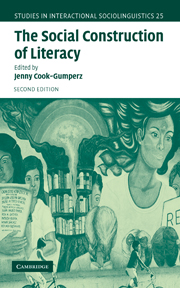Book contents
- Frontmatter
- Contents
- List of figures
- List of tables
- List of contributors
- Preface
- Acknowledgments
- 1 The social construction of literacy
- 2 Literacy and schooling: an unchanging equation?
- 3 Interactional sociolinguistics in the study of schooling
- 4 The language experience of children at home and at school
- 5 Narrative presentations: an oral preparation for literacy with first graders
- 6 Differential instruction in reading groups
- 7 Organizational constraints on reading group mobility
- 8 Developing mathematical literacy in a bilingual classroom
- 9 Spoken language strategies and reading acquisition
- 10 Speaking and writing: discourse strategies and the acquisition of literacy
- 11 The implicit discourse genres of standardized testing: what verbal analogy items require of test takers
- References
- Author index
- Subject index
8 - Developing mathematical literacy in a bilingual classroom
Published online by Cambridge University Press: 05 June 2012
- Frontmatter
- Contents
- List of figures
- List of tables
- List of contributors
- Preface
- Acknowledgments
- 1 The social construction of literacy
- 2 Literacy and schooling: an unchanging equation?
- 3 Interactional sociolinguistics in the study of schooling
- 4 The language experience of children at home and at school
- 5 Narrative presentations: an oral preparation for literacy with first graders
- 6 Differential instruction in reading groups
- 7 Organizational constraints on reading group mobility
- 8 Developing mathematical literacy in a bilingual classroom
- 9 Spoken language strategies and reading acquisition
- 10 Speaking and writing: discourse strategies and the acquisition of literacy
- 11 The implicit discourse genres of standardized testing: what verbal analogy items require of test takers
- References
- Author index
- Subject index
Summary
Introduction
In this chapter, I would like to address several questions which are not often raised in discussions about literacy, but whose answers may provide important insights into literacy as conventionally conceived – and into the kind of literacy that will increasingly demand attention, that is, the literacy entailed in the rapidly computerized society which appears to be developing worldwide. First, what might be said of the literacy which is implicitly sought through instruction in mathematics at the elementary level? Secondly, how might the role of language in teaching any subject, including mathematics, be revealed, through examining classrooms in which none of the participants are using their native language? Finally, what might an investigation of mathematics instruction in the English language in a Filipino classroom provide as counterevidence to disturbingly long‐surviving yet otherwise unsubstantiated propositions that children in non‐Western settings are constrained by their cultural and linguistic backgrounds from performing in classrooms in the active and creative ways purportedly characteristic of Western children? I propose that the evidence presented here is of crucial importance for furthering efforts to increase the literacy of children everywhere, and particularly in those cases where inequality of achievement is structured along ethnic, linguistic, and social‐class lines.
In particular, in presenting here a grade six mathematics lesson taught in a Philippine public school, I will develop the argument that learning and using mathematics is essentially a matter of acquiring patterns of discourse.
- Type
- Chapter
- Information
- The Social Construction of Literacy , pp. 185 - 217Publisher: Cambridge University PressPrint publication year: 2006



